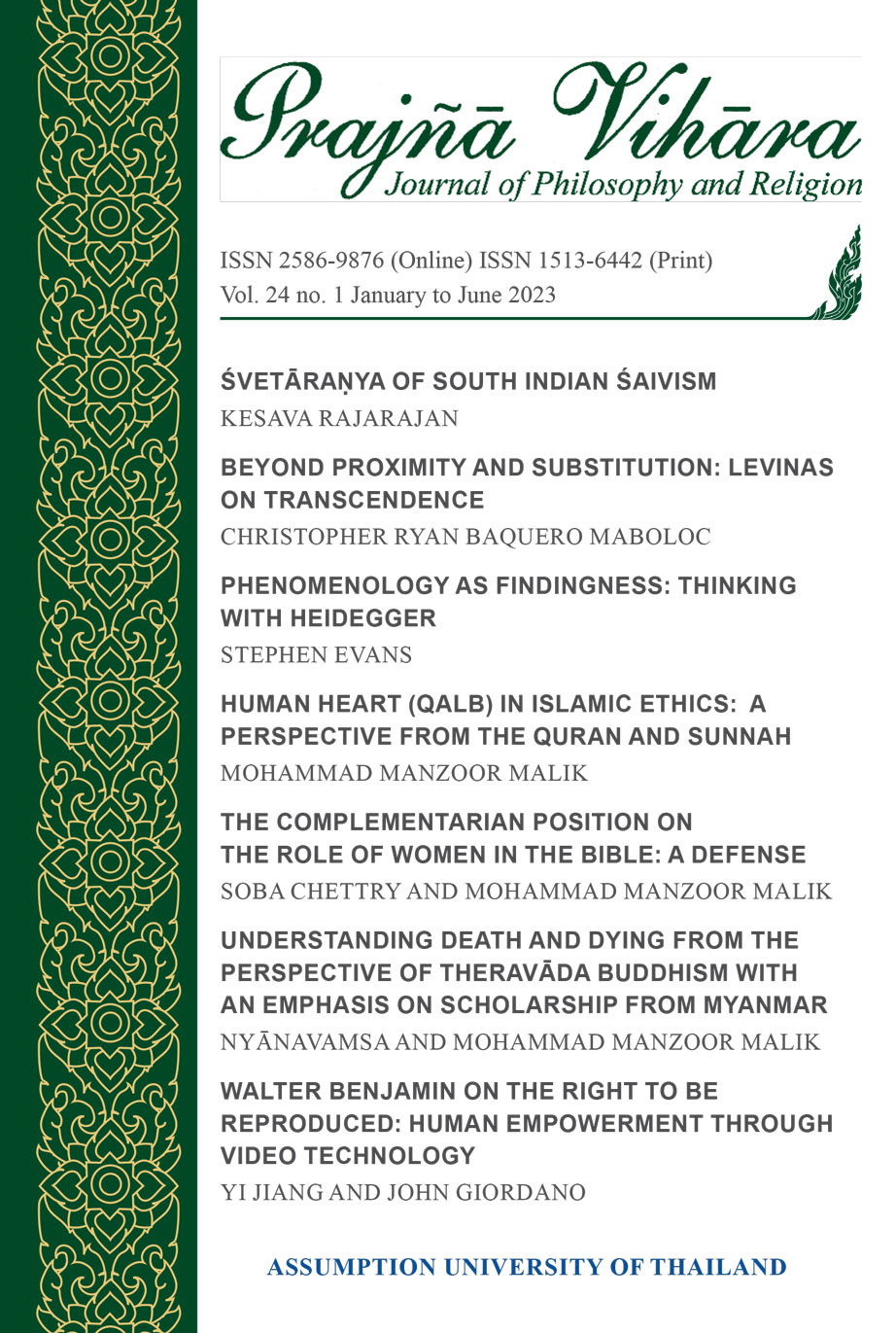BEYOND PROXIMITY AND SUBSTITUTION: LEVINAS ON TRANSCENDENCE
Abstract
Martin Heidegger’s philosophy is a form of an ontotheology
that reduces the encounter with ‘the Other’ into a
metaphysical abstraction. For this reason his idea of Being
tends to be morally naïve and oblivious to the reality of
suffering. For Emmanuel Levinas develops a philosophy
which challenges this where the relation between the
human person and ‘the Other’ is asymmetrical. This not
only challenges Heidegger’s ontology but also rectifies the
tendency toward egocentrism of Western philosophy in
general. This paper argues that Levinas’ idea ‘the other’ is a
manifestation of the Divine. Levinas is saying that without
this idea of the divine or God, there can be no way out of
the violence in human history. The traces of the Divine can
be found in the unique experiences of transcendence, such
as unconditional love.
References
Altez, Fleurdeliz. 2007. “Banal and Implied Forms of Violence in Levinas’
Phenomenological Ethics.” In Kritike, Volume 1, Number 1: 52-70.
Calasanz, Eduardo. 1998. “Ethics with a Human Face.” In Commentaries
on Moral Philosophy. Manila: Philippine Commission on Higher
Education.
Dahnke, Michael. 2001. “Ethics as First Philosophy.” A Book Review.
In Auslegung. Volume 24 (2): 199-218.
Garcia, Leovino. 1996. “The Infinite Responsibility to the Other.” In
Philosophy of the Human Person. Davao City: Ateneo de Davao
University: 1-13.
Heidegger, Martin. 1996. Being and Time. Translated by Joan Stambaugh.
New York. SUNY Press.
Kundera, Milan. 1984. The Unbearable Lightness of Being. Translated
by Michael Henry Heim. New York: Harper and Row.
Levinas, Emmanuel. 1979. Totality and Infinity. Trans. By Alphonso
Lingis. The Hague: Martinus Nijhoff.
Levinas, Emmanuel. 1989. “Ethics as First Philosophy.” In The Levinas
Reader. Ed. By Sean Hand. Oxford: Blackwell: 75-84.
Levinas, Emmanuel. 1990. Difficult Freedom. Baltimore: Johns Hopkins.
Levinas, Emmanuel. 1991. Otherwise than Being or Beyond Essence.
Trans. By Alphonso Lingis. Dordrecht: Kluwer Academic
Publishers.
Levinas, Emmanuel. 1996. “Martin Heidegger and Ontology.” In
Diacritics Volume 26 (1): 11-32.
Levinas, Emmanuel. 1998. The Provocation of Levinas: Rethinking the
Other. Edited by Robert Bernasconi and David Wood. London:
Routledge.
Levinas, Emmanuel. 1999. Alterity and Transcendence. Translated by
Michael Smith. London: Athlone.
Tatransky, Thomas. 2008. “A Reciprocal Asymmetry? Levinas’ Ethics
Reconsidered.” In Ethical Perspectives, Volume 15, Number 3:
-307.
Terreblanche, Salomon. 2008. “On History and Salvation in Emmanuel
Levinas and Ernst Bloch.” In Theological Studies, Volume 64,
Number 2: 885-906.
Urbano, Ryan. 2012. “Approaching the Divine: Levinas on God, Religion,
Idolatry and Atheism.” In Logos: A Journal of Catholic Thought
and Culture. Volume 15 (1): 50-81.
Walzer, Michael. 2006. “Terrorism and Just War.” In Philosophia:
Philosophical Quarterly of Israel. Volume 34: 3-12.
Wiesel, Elie. 1986. “Nobel Prize Acceptance Speech.” In Night. New
York: Hill and Wang.
Downloads
Published
Issue
Section
License
Consent to Publish and Transfer of Copyright
By publishing in Prajñā Vihāra, the author agrees to transfer and assign to Assumption University of Thailand as the Publisher of the Journal, the copyright to the Article in any form, including any and all rights, interests and claims related to it.
The author does retain the following rights:
- The right to make further copies of the published article for their use in classroom teaching.
- The right to reuse all or part of the published article in a compilation of his or her own works or in textbooks of which they are the author or coauthor.
- The right to make copies of the published article for internal distribution within their academic institution.
- All proprietary rights other than copyright, such as patent rights.
- The Article is his or her original work, and has not been published previously and is not under consideration for publication elsewhere.
- It does not contain any matter that is obscene, libelous, or contrary to law.
- They have obtained the necessary license or written authority and paid any and all related fees for the use and reproduction of text, tables, illustrations and other copyrighted work from the owners of the intellectual property rights, and can furnish the Publisher copies of the license/written authority and proof of payment of related fees upon the signing of this Agreement.
- They have the consent of the Co-Authors of the article upon the signing of this Agreement.
- In the event that they intend to republish, reprint or translate all or part of the Article in other publications, they will secure the prior written permission from the journal Editor.
Prajñā Vihāra adopts the Creative Commons Attribution (CC BY-NC-ND) license


